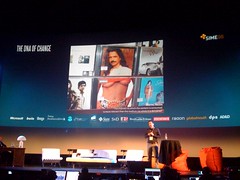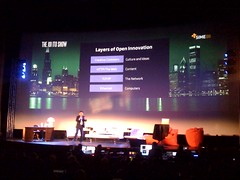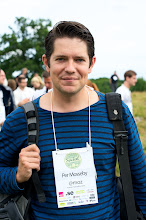David Kirkpatrick from Fortune opens up the conference. Brainstorm is a conference where one strives to understand how the world is changing, and putting technology in that context. About the earthquake in China: "People that were on Twitter knew what was happening, before the government did."
WHAT'S TECH GOT TO DO WITH IT
Michael Dell (Dell)
Gary Hamel (London Business School)
Marc Benioff (salesforce.com)
Christiane zu Salm (Hubert Burda Media)
Michael Dell
-------------
Is tech making the world better? Of course! The vast majority of everyone coming onto the Internet today are from developing countries. Almost all transitions in industry today, is driven by the speed of digital communication.
What is the main thing happening in technology today? Every country, even the ones that used to live fairly isolated, isn't anymore. And wealth: Today, we have a disproportionally large slice of the world's wealth, but the pie is getting bigger. We have to start relating to that reality.
And about Dell: We're trying to be a company that listens, and have big ears.
Gary Hamel
-------------
New technology has made the world a better place. Human creativity is saved and utilized in such a different way. Before, a lot of creativity and ideas just existed with people, and then went away. Today, you'll easily channel the creativity through blogs or Youtube almost for free.
How do we mobilize people to get things done? Industry: All tech for that is designed just after the civil war. The invention of management. In the future, one of the greatest differences will be how we manage. We'll see an even bigger difference when this impacts who makes decisions, when and so forth. This will be fundamentally different.
Marc Benioff
--------------
The most powerful part of this, is that it doesn't begin with Dell and people talking to each other, but with people talking to people about Dell, discussing products or prototypes in Dell's discussion forums. Dell has to prioritize and interpret what the customer says, and get back to the customer after that.
Like the anti-spill-thingy that Starbucks has now, that you can stick into your cup when going in your car. When it's pushed in, you don't spill your coffee, and when you pull it out, you can use it to stir your coffee. It turns out that this was a customer's idea. You have to use you big ears and listen.
Christiane zu Salm
---------------------
I wonder if it can become too complex from a management perspective - almost impossible to manage?
David
------
In the 2001 Brainstorm, Clinton was talking about a global spiritual awakening. This was just a month or so before 9/11. Here we are, seven years later, and it strikes me that we all might be further along in understanding that feeling?
Marc
-----
Yes, I think Clinton said: "Change in the world can only happen with a change in consciousness." Like Dalai Lama's "Peace with inner peace". We have seen that the Internet has changed to a collaboration model with 2.0, and we're soon see Internet 3.0 and innovation, which Jeff Bezos will talk about later. We're going from the possibility to Transact [1.0], over Collaboration [2.0], to Innovation [3.0]!
Christiane
-----------
Germany is known for inventing things. mp3 was invented in Germany. But the business took off somewhere else. That's a thing in the German culture: we don't really like to take risks. We will always be good enough to compete anyway. What worries me is the demographics. Europe is growing substantially older, compared to the US. I mean, my mother doesn't even know what an iPhone is.
Gary
-----
Somehow I think we overestimate the importance cultural differences. We're all managing companies with management 1.0-methods. And know we're coming to a point where most growth and new companies will come from imagination and creativity. Today, there are no country, where more than 20% says they're highly engaged in what they're doing. These new type of innovations are allergic towards the traditional power structures and hierarchies.
If you would've taken the hundred smartest people out of all the Fortune 500-companies 20 years ago, and ask them if the most used and robust computer system would be developed by an army of 1.6 million volunteers, I think that less than one out of a hundred would have thought that to be possible.
Marc
-----
Everyone have an urge for more transparency on all levels. If this is going to work, we've got to stand up and demand to know exactly what is happening everywhere with information. In the end, it is all about that trust. To be able to achieve the type of ideas we're talking about, we need that type of trust. If we have an increasing dependency on these systems [in the cloud] on all levels, then we really need to have that transparency.
How is this going to change leadership and management?
Gary
-----
On the net - all hierarchies are natural. You have a position because you have something to say, something to add. In companies' traditional power structures, people's potential to add and contribute diminish much quicker than their position in the power structure do. All that is going to change.
 It was great listening to Joi Ito, who had refined his Creative Commons presentation further since SIME. For those of you who haven't looked around too much at the Internet for the past few years, Creative Commons is an NGO that provides licenses that gives copyright owners the possibility to easily share their works in the way they want. A very famous and recent example is the Barack Obama campaign who continuously shared CC-licensed photographs on Flickr during and after the campaign.
It was great listening to Joi Ito, who had refined his Creative Commons presentation further since SIME. For those of you who haven't looked around too much at the Internet for the past few years, Creative Commons is an NGO that provides licenses that gives copyright owners the possibility to easily share their works in the way they want. A very famous and recent example is the Barack Obama campaign who continuously shared CC-licensed photographs on Flickr during and after the campaign.









